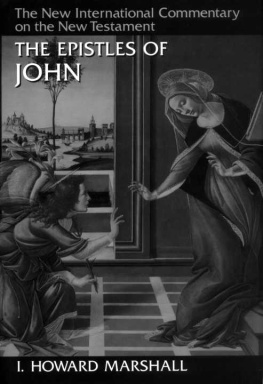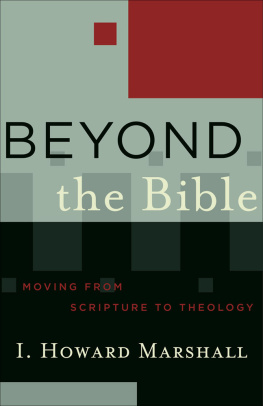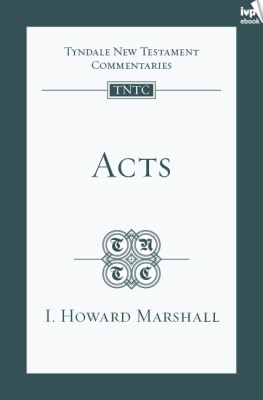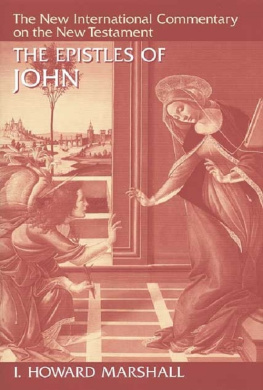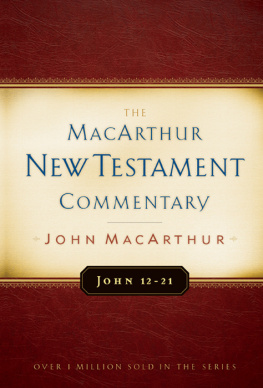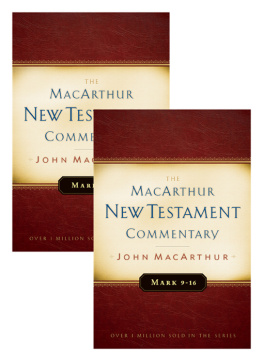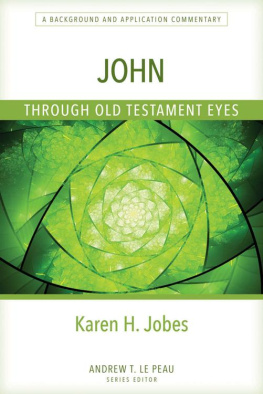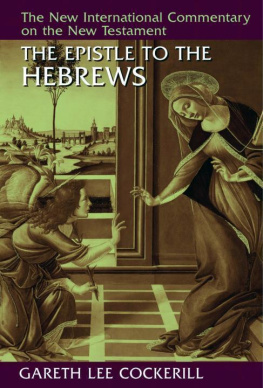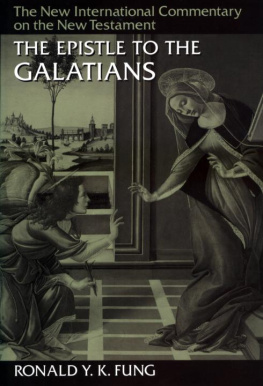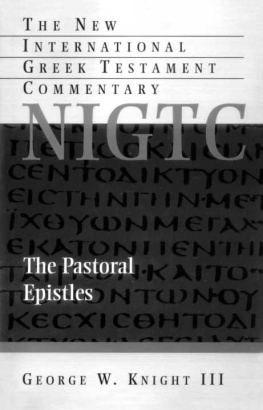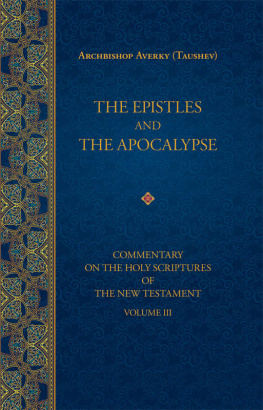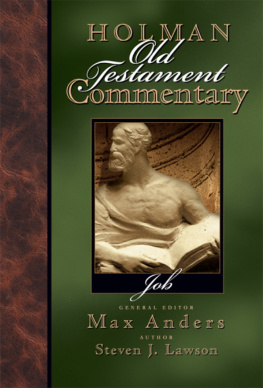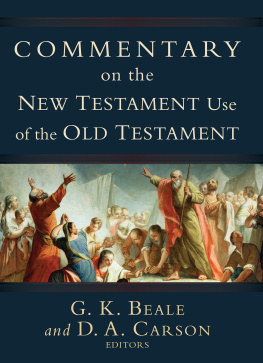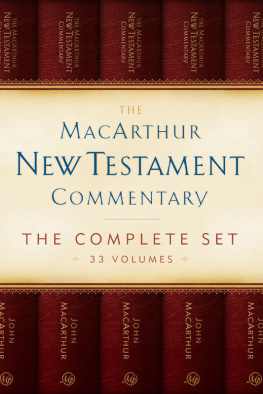THE NEW INTERNATIONAL COMMENTARY
ON THE
NEW TESTAMENT
General Editors
NED B. STONEHOUSE
(1946-1962)
F. F. BRUCE
(1962-1990)
GORDON D. FEE
(1990)
THE EPISTLES OF
JOHN
by
1. HOWARD MARSHALL




CONTENTS
vii
ix
xiii
xv
INTRODUCTION
THE SECOND EPISTLE OF JOHN
THE THIRD EPISTLE OF JOHN
THE FIRST EPISTLE OF JOHN
INDEXES
EDITOR'S PREFACE
When it was decided to replace Dr. Alexander Ross's commentary on the Epistles of James and John by two separate volumes, it was necessary to secure two commentators. Happily, hard on Dr. James Adamson's acceptance of the invitation to write the commentary on the Epistle of James came Dr. I. Howard Marshall's consent to undertake the companion work on the Epistles of John.
Dr. Marshall is a graduate of the Universities of Aberdeen and Cambridge; he also spent a period of study under Professor Joachim Jeremias at Gottingen. For over twelve years he has been a member of the teaching staff of the Department of New Testament Exegesis at the University of Aberdeen, where he now holds the status of Reader.
He gave evidence of his interest in Johannine literature when, as a youthful scholar, he contributed the articles on the Gospel and Epistles of John to the New Bible Dictionary (1962). Since then he has proved his worth as a New Testament exegete and theologian in a succession of scholarly publications-some of a specialist nature and some more popular. In criticism and exegesis he has specialized thus far in Lukan studies, with his Luke: Historian and Theologian (1970) and The Gospel of Luke: A Commentary on the Greek Text (1978). He has written popular Scripture Union commentaries on Mark (1963) and Kings and Chronicles (1967). An important symposium on New Testament Interpretation appeared under his editorship in 1977. In New Testament theology his major work is a study of the doctrine of perseverance, Kept by the Power of God (1969). He is also author of Christian Beliefs (1963), The Work of Christ (1969), The Origins of New Testament Christology (1976), and I Believe in the Historical Jesus (1977). These works, together with a number of articles in learned periodicals, have placed him in the front rank of British New Testament scholars, and the New International Commentary on the New Testament is to be congratulated on enlisting him among its contributors.
A fresh feature of this volume is the inclusion of an "Invitation" to the general reader as well as an "Introduction" for the specialist. Another fresh feature is a rearrangement of the traditional order of the three letters: 2 John and 3 John are studied before 1 John. This means that the two shorter letters are not relegated to the position of appendices but are treated as important documents of early Christianity in their own right.
Since writers of replacement volumes in the New International Commentary are left free to compose or select their own translations, Dr. Marshall has chosen to base his exposition on the New International Version.
With these prefatory words, the editor leaves Dr. Marshall to engage his readers' attention and appreciation by what he has to say in the following pages.
F. F. BRUCE
AUTHOR'S PREFACE
There are already so many commentaries on the various books of the New Testament that anybody who adds to their number should be obliged to give some defense of himself. The immediate occasion for the present work was a request by the editor of the New International Commentary on the New Testament that I should prepare a fresh volume on the Epistles of John. The original volume in the series by Dr. Alexander Ross also included the Epistle of James. The decision to publish a new, considerably fuller commentary on James in an individual volume meant that the treatment of the Johannine Epistles by Dr. Ross must also be replaced by a new volume at greater length.
It was my privilege to get to know Dr. Ross through his visits to the Aberdeen University Evangelical Union where he was a muchappreciated speaker. Both as a teacher in the Free Church of Scotland College and then during his active retirement as minister of the Free Church in Burghead, he exercised a gracious and scholarly ministry, and he was held in high esteem both inside and outside his own denomination. His commentary on these Epistles was one of the first books that I ever reviewed, and I am glad now to have this opportunity of paying respect to his memory.
Unfortunately Dr. Ross's commentary on the Johannine Epistles was limited in length and consequently in the amount of detailed exegesis of the text which it could provide. It was also written before the development of recent study of the Epistles. Writing in 1958, Dr. William Barclay could comment, with some exaggeration, that there were not many outstanding commentaries on these Epistles, although he then went on to list the works of B. F. Westcott, A. E. Brooke, and C. H. Dodd as the best, particularly the last mentioned. The situation has now changed. A year earlier than Ross's work there was published the first volume in a new German series. Herders Theologischer Kommentar zum Neuen Testament is a Roman Catholic production, intended to be on the scholarly level of the International Critical Commentary but with particular stress on theological exposition. This first volume was by R. Schnackenburg on the Epistles of John, and it remains unrivalled as a comprehensive and well-informed study of the Epistles; it is the fundamental work for the serious student. It was followed in 1957 by a full-length monograph by W. Nauck, Die Tradition and der Charakter des ersten Johannesbriefes, which opened up new viewpoints in the light of the Dead Sea Scrolls. The commentary by R. Bultmann which followed shortly after (1967) and would otherwise have been important in its own right had little that was fresh to offer in comparison with Schnackenburg's work; curiously it is Bultmann's work which has been translated into English rather than Schnackenburg's.
Among English works particular importance attaches to J. R. W. Stott's work in the Tyndale New Testament Commentaries, which is fuller than many of the other volumes in that series and remains the best general commentary on the Epistles, well based on sound scholarship but clear and practical. Nor can I fail to mention the work of my former teacher, J. N. S. Alexander, in the Torch Bible Commentaries, and the more recent work of J. L. Houlden in Black's New Testament Commentaries. But perhaps the most outstanding of the post-Schnackenburg era of commentaries is that by M. de Jonge; it is written in Dutch, which limits its availability, but its basic insights have been incorporated in the handbook on the Letters of John in the United Bible Societies' Helps for Translators series: this is an extremely valuable book, useful to all students and not merely to Bible translators.
Other works could be mentioned, but these I have found to be the most useful. The justification of the present commentary lies in its attempt to mediate to English readers the results of recent study, especially on the Continent, and to do so in such a way that the ordinary reader will not be distracted by the apparatus of scholarship. I have, therefore, attempted to separate off the technicalities from the exposition by rigidly confining the latter to the footnotes and also by writing a separate "Invitation" to the general reader and "Introduction" for the student. It is also arguable that too few commentaries attempt to expound the New Testament for the modern reader, and I have made some attempt to indicate how I think the Epistles should be interpreted and applied in the contemporary situation. One further feature of the commentary is that it deliberately treats 2 and 3 John before I John, in the hope that readers will move from the easier books to the more difficult.

